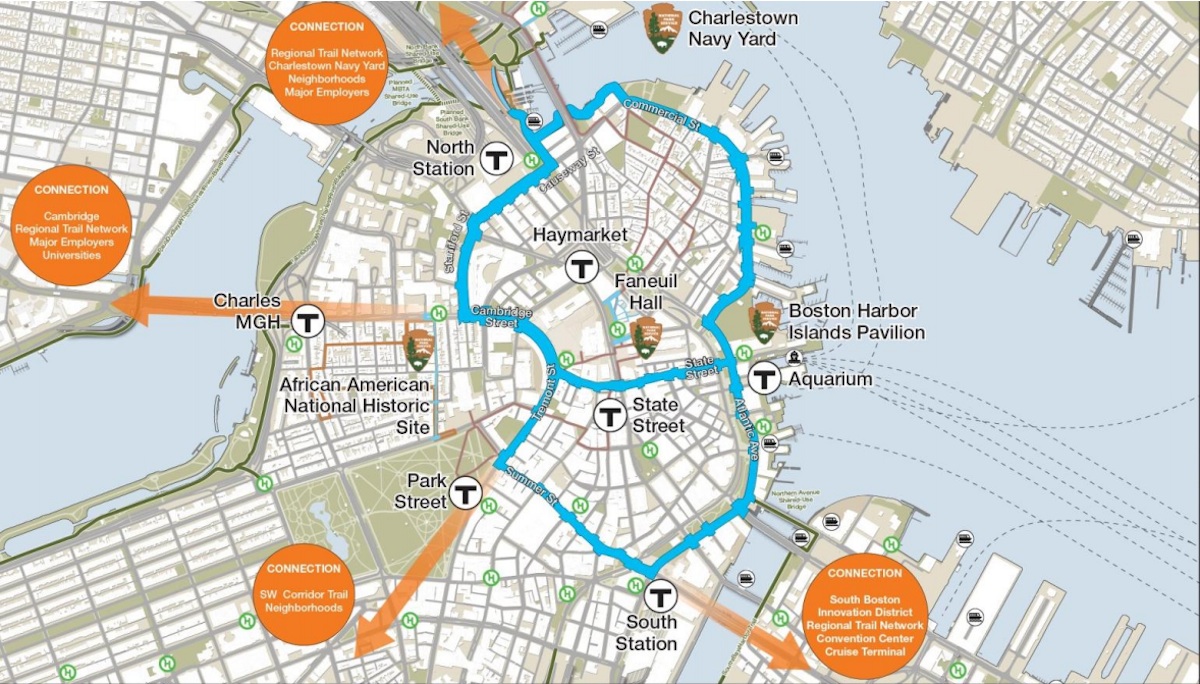There’s a Public Hearing on the Proposed ‘Connect Historic Boston’ Bike Loop

Image via Connect Historic Boston
City officials are holding a public meeting tonight to discuss a proposal for a continuous “family-friendly” bicycle loop around downtown, which will connect cyclists to historic sites all around the city with relative ease.
Cyclists are encouraged to attend the hearing on the 25 percent design of the Connect Historic Boston proposal, a project that’s being funded through a federal Transportation Investment Generating Economic Recovery (TIGER) grant. The project includes a new bike trail around downtown, which will feature the installation of buffered, protected bike lanes, special paving to separate the trail from the roadways and pedestrian walkways, and two-lane tracks for cyclists throughout.
According to project details, the four-mile track would circle the downtown, and require some modifications to busy streets to better connect cyclists with regional paths and T stations. The bike trail would include a two-way, grade separated bicycle track along Staniford, Causeway, and Commercial Streets, as well as Atlantic Avenue. It will also require the reconstruction of Lowell Square and Keany Square.
The project also calls for the installation of bicycle signage and lane markings within state-owned properties along the waterfront, stretching from Prince Street Park to Beverley Street Extension.
As an extra perk, project designers want to include bikeshare, bike rental, and bike parking options along the route. The proposed bike trail is supposed to take “the stress” out of traveling downtown for cyclists, whether they be tourists on Hubways or daily riders, according to the city’s website.
“Bicycling around downtown is confusing and uncomfortable with one-way streets, narrow lanes, and lack of bicycle accommodations,” officials said in a description of the project. “Increasing bicycle trips from transit hubs to popular destinations, workplaces, or homes would help reduce congestion on transit by providing an alternative to stop transfers on the subway system.”
A design overview can be found on the Connect Historic Boston website. Plans will be on display before the hearing begins on Wednesday, with an engineer on site to answer questions regarding the proposal.
Bike advocates have been pleased with the progress of the project thus far. “This is the city’s best shot at getting some real bike infrastructure in the downtown area,” said Pete Stidman, executive director of the Boston Cyclists Union. “MassBike, ourselves, and a great deal of people from the bike advocacy world have been watching this very carefully, and they keep improving the cycle track. Right now, with our crazy streets, it’s about as good as it’s going to get. For cycling safety this is far and away the best project the city has seen so far. This will really allow people with kids, and older folks, to navigate the city—it’s revolutionary for Boston.”
The Connect Historic Boston plan is a four-part project. Preliminary costs for the entire project, which features redesigns to other historic spots in Boston, including Constitution Road, the Blackstone Block between Haymarket and Faneuil Hall, and traffic-calming measures and increased pedestrian access on Joy Street, is estimated at $23.2 million.
State and federal workers pushing the project forward hope to have the complete permitting documents for the bike trail portion filed by the spring so they can advertise for construction contracts this summer. Construction is tentatively scheduled to begin in the fall of this year.
If You Go:
Location: Boston City Hall, Room 801
When: Wednesday, February 26, at 6 p.m.


